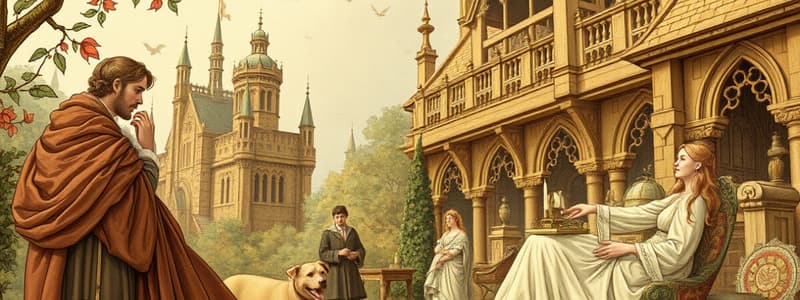Podcast
Questions and Answers
What does the Clerk prefer to spend his money on?
What does the Clerk prefer to spend his money on?
- Clothes
- Food
- Horse feed
- Books (correct)
Who proposes the tale-telling game in The Canterbury Tales?
Who proposes the tale-telling game in The Canterbury Tales?
The Host
How does Chaucer's character appear through his narrative voice?
How does Chaucer's character appear through his narrative voice?
- Satirical
- Indifferent
- Credulous
- Both A and B (correct)
What qualities make the Knight a perfect knight?
What qualities make the Knight a perfect knight?
What is the Squire known for besides his jousting skills?
What is the Squire known for besides his jousting skills?
What does the Yeoman carry that resembles Robin Hood?
What does the Yeoman carry that resembles Robin Hood?
The Prioress genuinely weeps for a mouse caught in a trap.
The Prioress genuinely weeps for a mouse caught in a trap.
What is the Monk's favorite pastime?
What is the Monk's favorite pastime?
Flashcards are hidden until you start studying
Study Notes
The Clerk
- The Clerk is depicted as extremely poor, unable to afford basic necessities like food or proper clothing.
- Prefers spending money on books over sustenance, indicating a prioritization of education and knowledge over material comforts.
The Host
- Acts as the central figure driving the narrative of The Canterbury Tales by initiating the tale-telling competition.
- Described as a large, jovial man with sharp eyes, embodying the role of the organizer and entertainment director for the pilgrims.
Chaucer
- Serves as both narrator and character, revealing his nature through his portrayals of other pilgrims.
- Exhibits a range of perspectives, from naive admiration to satirical critiques, allowing insight into his own character through the tales he tells.
The Knight
- Characterized as the ideal knight, experienced in numerous battles across diverse locations, embodying heroism and martial valor.
- Described as gracious and respectful, having never spoken harshly to anyone, reinforcing his noble and virtuous nature.
The Squire
- The Knight's son, depicted as youthful and skilled, capable in horseback riding, jousting, and culinary service.
- Embroidered attire suggests a focus on appearance and youthful extravagance, with a greater emphasis on charms and romantic pursuits than on battlefield achievements.
The Yeoman
- Serves as the Knight’s sole servant, resembling the legendary Robin Hood, dressed in green and equipped for outdoor tasks.
- Responsibilities include protecting the knight’s forests, exemplified by well-maintained hunting equipment, indicating dedication and proficiency in his role.
The Prioress
- Portrayed as overly concerned with appearing courtly and dainty, engaging in affectations such as nasal singing and overly careful eating.
- Her weeping over a trapped mouse contrasts with her indifference to feeding her hounds meat, highlighting a façade of compassion rather than genuine care.
The Monk
- Described as a robust figure who revels in hunting, owning lavish horses and greyhounds, reflecting his indulgent lifestyle.
- Embodies a contrast to traditional monastic values, indicating a departure from expected religious duties toward personal pleasures and pastimes.
Studying That Suits You
Use AI to generate personalized quizzes and flashcards to suit your learning preferences.




